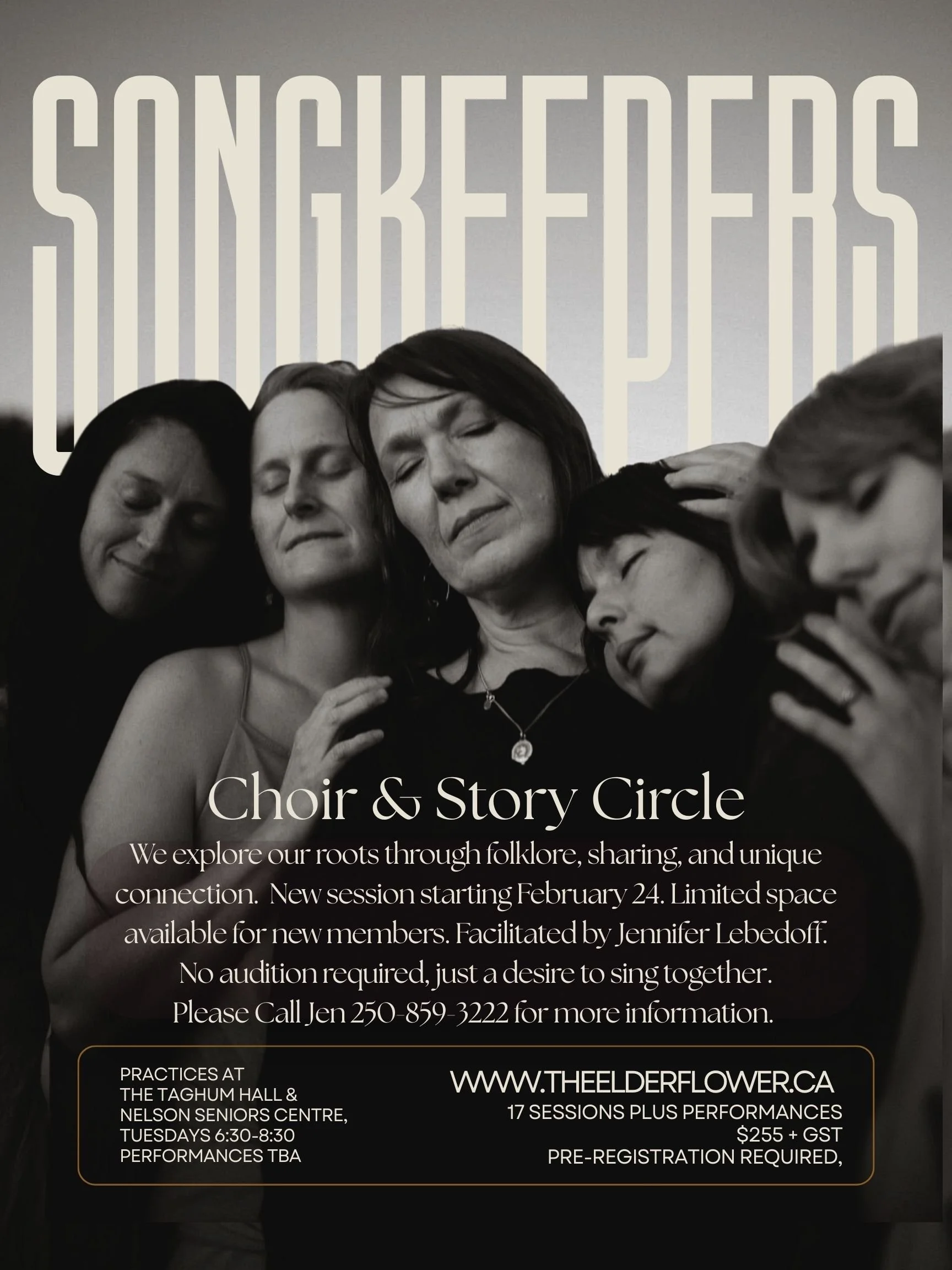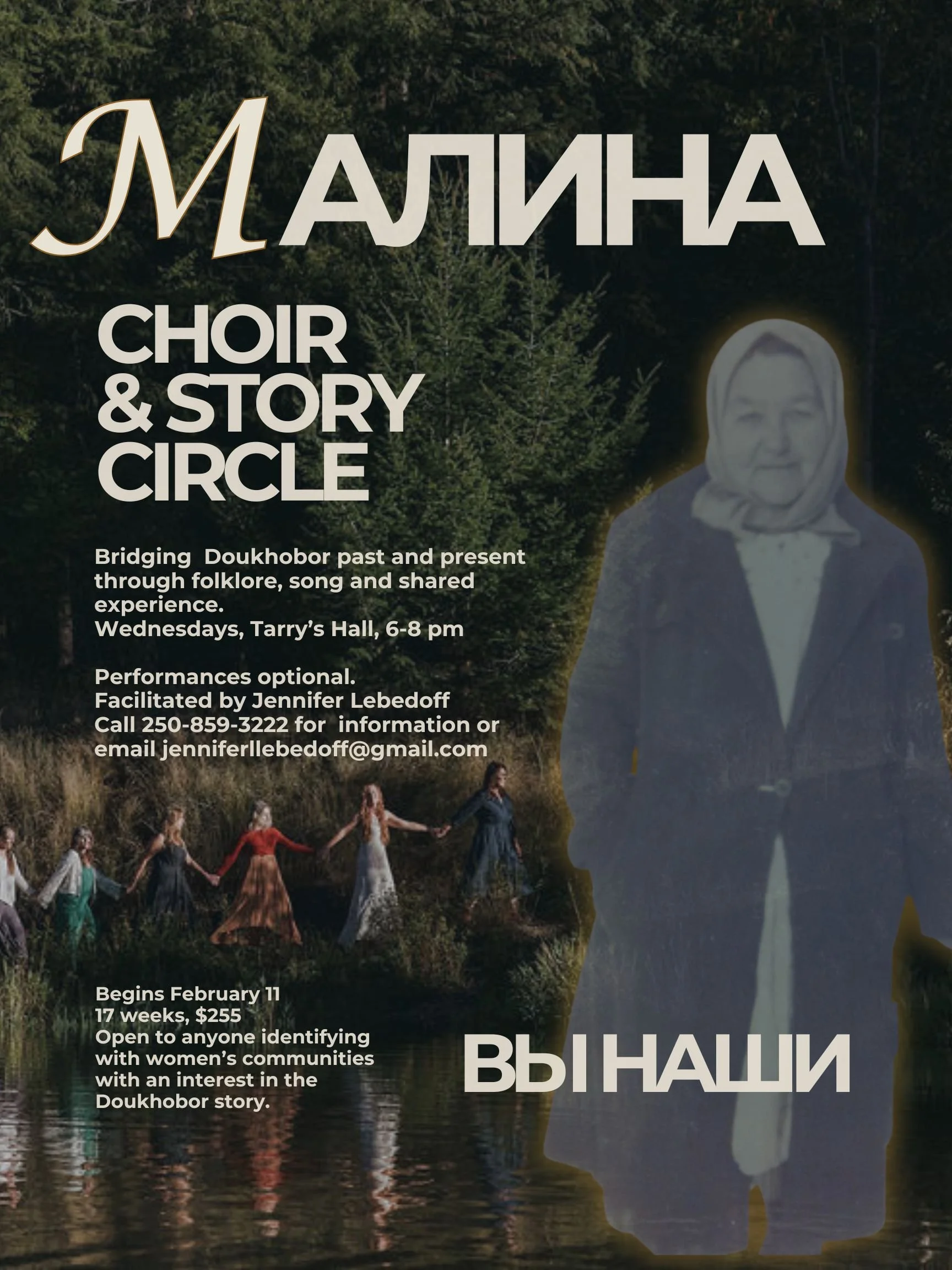
Our Rivers & Roots Run Deep
Nightingale, Free Your Voice
Attend a choir season with the Elder Flower. We sing together and share stories, unearthing deep roots and enjoying a shared connection.
Spring 2026 Registration Opening Soon! Join our mailing list to be notified about Spring registration, choirs begin February 2026.
Choir is not dedicated to recovery, although we find it to be a very healing and uplifting creative activity that someone can do as part of making their recovery beautiful.
There are songs singing in your bones.
The response to our choir has been a little breathtaking. What started as a non-audition choir exploring our ancestry through folklore and song has now grown to a group of friends who have led communities in song, performed sold-out shows, and appeared at community events like the Kaslo Jazz Festival.
We are now opening registration for a new season, beginning February 24, Tuesdays at 6:30. Most of our practices are at Taghum Hall, with the Nelson Senior Centre as an alternate location.
Though we are still a non-audition choir, our confidence and musicality have been improving. It’s suggested that you can carry a tune and have a sense of rhythm, as body percussion will be introduced this season.
Carrying on in the traditions of artists like Ma Muse and Alexandra Blakely, our shows get the whole audience participating. We strive to connect the community in the spirit of home and belonging.
We’re not a fancy choir. We sing folk songs, front-porch music, and shelling-peas music. We clap, and we stomp. Come help us weave a tapestry of belonging…
Please fill out this form. You will be notified with payment instructions if we have a spot for you. Limited spaces are available.
We often perform with our Sister Choir, Malina.
Malina
I often joke that I was born singing 5-part harmony. Raised Doukhobor, spontaneous song erupted in my house.
I was fed borscht and stories of the village and the diasporic journey the Doukhobors took, so that I could be here in this time. These traditions, stories and songs were shared orally.
My grandparents have passed on now. They called it “going home’. Now it’s our turn to not only share their stories and songs, but to write our stories as the ancestors of tomorrow. Every culture relies on art and creativity to keep it alive.
It’s our turn.
This group, Malina, started small with a dozen or so women in Tarry’s Hall. Each week we are prompted by discussion topics, and themes. We sing in both English and Russian. We perform with the Songkeepers, and we have sung at community concerts. This year, the choirs will combine to perform at the USCC Festival in addition to our community concert series.
No Russian Speaking Skills Required.
You do not have to be of Doukhobor background to participate.
You don’t have to be a part of any Doukhobor Organization, or you can be. People with backgrounds from USCC, Sons of Freedom, Independent, and other Eastern European Ancestries, or other immigrants, might find this interesting. (or might find our sister choir, the Songkeepers a fit)
You do not have to perform to participate. Some members just come to listen, share, and sing in our smaller weekly group.
A note on Spirituality: Our Doukhobor ancestors were a spiritual group of people persecuted for their beliefs who immigrated to Canada from Russia and surrounding countries. The foundational belief is that God, or a divine spark, exists in everyone, uniting us in a shared humanity. Though this choir is not religious, we will include some discussions of spirituality and the soul as part of this season. You do not have to be religious or share this belief to attend.
FAQs
What if I’m not Doukhobor? Or maybe I’m just a small part Doukhobor. Can I still register for Malina?
First off, any part of your ancestry is a part of your story, and you can be curious about it! And if you don’t have any Doukhobour ancestry and have a curiosity to learn about a culture that plays a part in this place, you are welcome to join us!
Maybe you have Georgian, Ukrainian, Polish, Russian or other Eastern European ancestry. You might be surprised at how similar some of the singing, story and symbolism are. Perhaps you grew up in this area and are curious about this music and story.
We have had women from other backgrounds join us. While the majority of the sharing focused on Doukhobor stories, they shared about their ancestry and their firsthand experience being immigrants to this country.
Our singing and sharing together celebrate a shared sense of humanity and community. You are welcome, whoever you are.
Are scholarships available?
Yes! Full and partial scholarships are available, some by gift and some from the proceeds of our performance at Choirpalooza and the Nelson and District Arts Council. More details are found on the registration form.
I don’t know my ancestry…
This too is ok. You will be an ancestor someday, and you can tell the story of this place now, along with the things that influence it: nature, culture, food, and music. You are invited to excavate stories of women and nature and determine what themes you would like to explore and what wisdom you would like to share. You can also add your voice to the choir to create something beautiful together, now.
Do I need to speak and understand Russian to sing in Malina?
We will be singing some Russian music, but we’ll also sing in other languages. No Russian experience is necessary. The Taghum Choir has also sung songs in other languages. We learn them by ear.
Do we only sing ancestral folk music?
No. Our repertoire is co-created. We also put together playlists and have song sheets of uplifting songs that explore some of the themes we discuss (the last choir LOVED river songs and found folk tales about women and rivers from around the world).
What if I am not a Singer?
You were born with an instrument: a voice. You may be out of practice! If you enjoy listening to music, you can sing. The beautiful thing about a choir is that it is part singing and part listening! We are a group, and the more practiced singers naturally help the section. With time, you’ll discover your unique voice and realize that it is each unique voice layered together that makes a choir special.
These are non-audition choirs, but some of the singers have been participating for several seasons now, and our experience is growing. If you do not have choir experience, we’d suggest starting in the melody or “middle” section.
It is suggested that you can carry a basic melody and have some sense of timing, as we will be doing some body percussion this year.
I don’t connect to my ancestry: I come from a “boring” culture or one I’m not particularly proud of.
This is also something that comes up in our group. Sharing stories and songs also shares our humanity. We can acknowledge the hard feelings we have about our pasts, and we can also claim the beautiful parts that we often discard when we have challenging feelings about who we are or where we are from.
We might discover something we love about our story or ourselves, and perhaps settle a part of our inner spirit, even imparting joy.
I don’t like singing solo. Will I have to?
No. You do not have to do anything you don’t want to. When we do circle sharing, you are welcome to say “pass”.



